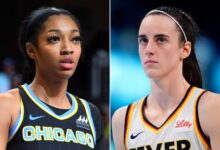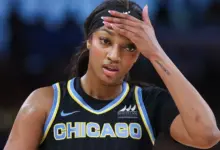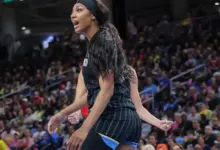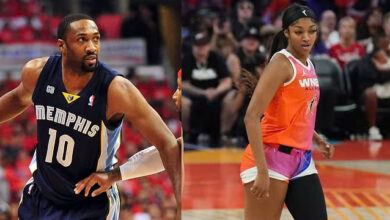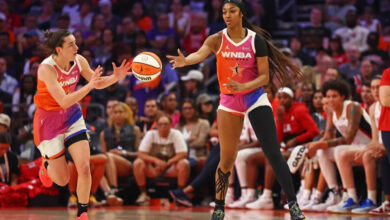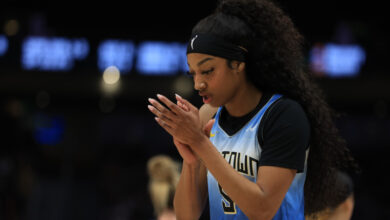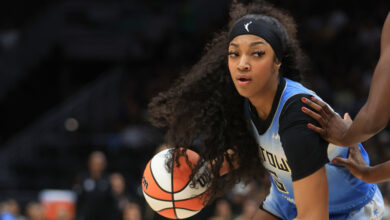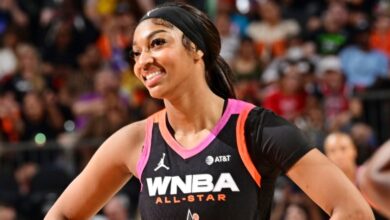Caitlin Clark is heavy favorite for WNBA rookie of the year. It’s the wrong choice
The Indiana Fever guard has had an impressive first season as a professional. But her old college rival Angel Reese has been consistently excellent
Caitlin Clark is heavy favorite for WNBA rookie of the year. It’s the wrong choice
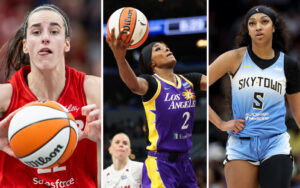
The Las Vegas Aces are gunning for a third consecutive WNBA title behind two-time MVP and defensive player of the year A’ja Wilson, but they find themselves outranked in the standings by the likes of the New York Liberty and Connecticut Sun. Diana Taurasi, 20 years after entering the league in 2004, continues to be an engine in the Phoenix Mercury backcourt. And then, of course, there are the rookies.
Caitlin Clark of the Indiana Fever may already be the most famous women’s basketball player ever. Her old college rival, Chicago Sky’s Angel Reese, has become a household name in her own right. In very different ways, the two players have come to headline a rollicking rookie of the year race. Here’s the tale of the tape – so far.
Caitlin Clark, guard, Indiana Fever
The argument for: Clark is not carrying the WNBA on her back, exactly, as much as she’s building on the progress the league spent years making before she came along. But she is still the league’s biggest draw. Her every move is scrutinized – often by those with an agenda beyond basketball – and, as with every star rookie, opponents work tirelessly to shake her up. But Clark has generally handled the limelight well while still conjuring a bit of magic on the court. She just became the first rookie in league history to post a triple-double when she produced 19 points, 13 assists, and 12 rebounds in a win against the Liberty on Saturday. Her prodigious playmaking ability has been on frequent display: Clark is third in the WNBA with 7.4 assists per game, despite playing on a team that was bad enough to get the first overall pick two years running. She’ll only get better from here, so her case for rookie of the year should get stronger as the season winds on.
The argument against: Clark hasn’t been that good. She is an undeniable star, but don’t tell that to WNBA defenders, who have denied her quite a lot. Her 39.3 shooting percentage is significantly worse than her career average (46.2%) in four record-setting seasons at Iowa. In the four games before Saturday’s sparkling triple-double, Clark shot an ugly 33% from the field and turned the ball over nearly six times a game. That’s been a recurring problem. Clark’s 122 turnovers through Saturday are well ahead of any other player. Perhaps rookie of the year honors should go to a player who doesn’t so frequently give the ball to the other team – or at least one who has more made field goals per game than she has committed turnovers. (For now, Clark does not, averaging 4.9 made shots from the field and 5.5 giveaways.)
Angel Reese, forward, Chicago Sky
The argument for: It’s simple: Reese has been the best rookie in the WNBA up to this point in the season. The 6ft 3in forward has been utterly dominant as a rebounder, her calling card going back to a decorated college career at Maryland and LSU. Reese’s 21.3 total rebounding percentage through Saturday was the best in the entire league among regular rotation players. She is a disruptive force in the middle of the Chicago defense, and she manages to score plenty of points too, as demonstrated by an ongoing streak of 13 double-doubles. That streak isn’t just a rookie record but a record for the whole history of the WNBA. Not bad for a first-year player. Reese has done it all while dealing with her own media circus and intense public focus on everything she says and does. By both conventional stats and advanced numbers like win shares, Reese rules all WNBA rookies comfortably.
The argument against: It’s not a very good one at this point. Reese should be the frontrunner, even though betting markets are only slowly warming up to the idea of someone other than Clark winning the award. But if you want to play devil’s advocate, Reese adds almost no value as a perimeter shooter and is not a polished finisher around the basket. Her rebounding totals, excellent as they are, have long been inflated by Reese’s many opportunities to collect her own misses around the basket. She had plenty such chances at LSU, where she shot 47.1% from the field in her senior season. She has had plenty more with the Sky, where she has shot 41%. Taking almost all of her shots from around the basket, unlike Clark, has given Reese chances to follow up and increase her rebounding totals without necessarily being efficient. Clark doesn’t get the same stat-padding opportunities around the rim and has less margin for error in her pursuit of efficiency, so perhaps the Fever guard should get some extra leeway in evaluating her early stat lines.
Rickea Jackson, guard, Los Angeles Sparks
The argument for: Life’s more interesting when there is a spoiler in the mix. There is only the most remote chance of someone not named Clark or Reese winning the award. The other most likely candidate may be Chicago center Kamilla Cardoso, but she faces two problems – injury kept her out of a handful of games in the season’s early going, and she shares a frontcourt with Reese, who is clearly a better candidate. So any unlikely interloper would have to come from elsewhere, and Jackson fits the bill. She’s the only other rookie to average double figures in scoring (10.4 points per game) and has done so with more efficient shooting numbers than Clark or Reese, and has far fewer turnovers than Clark.
The argument against: Well, you get it. Reese and Clark are making everyone else’s cases moot.
